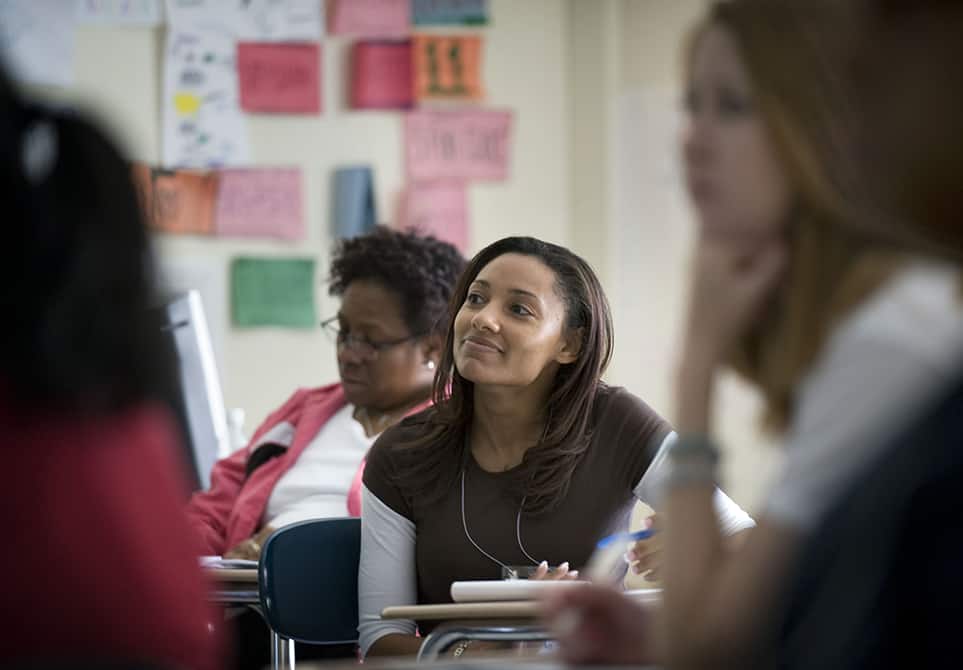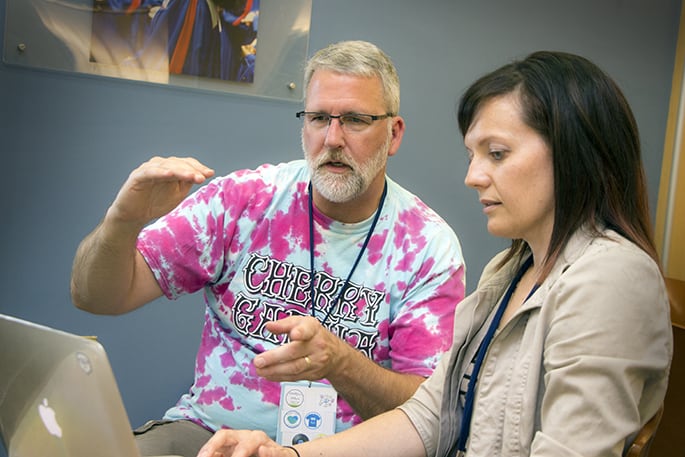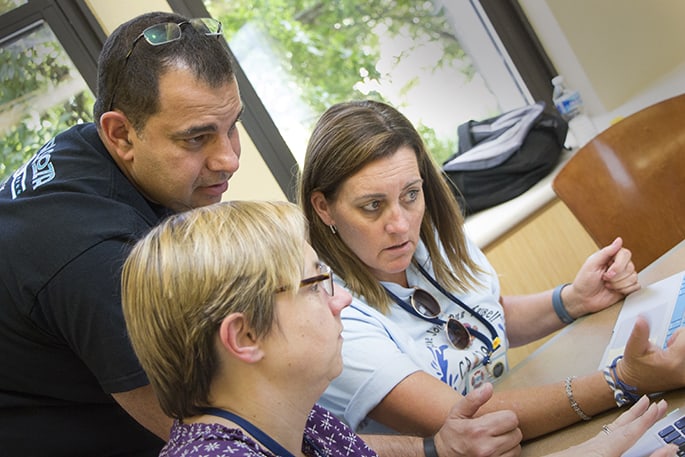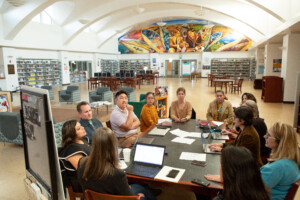10 Must-Know Professional Development Insights from Discovery Education

We get to spend a lot of time talking to and learning from the folks in the digital learning “trenches”–the teachers, principals, superintendents, parents and leaders who are working on the front lines of education innovation. We’ve had the pleasure of doing this work for several years, and it’s been interesting to watch how the FAQs have evolved over time. Early conversations (and publications) revolved around questions like, “What is blended learning or competency-based learning or personalized learning? How do I know this is what is best for kids, and why should I make these shifts?”
Now the most frequently asked questions we get asked are, “How do I get started? And where do I find the PD for my teachers that I need to make this happen?”
We’ve seen this collective shift from “why” to “how” happening everywhere–from individual conversations to national conferences. At Getting Smart, we’re committed to tracking and shaping the field through the services we offer and through our media channel GettingSmart.com. It’s through conversations with people who are doing the work and sharing their insights with our readers that we’re able to connect people to the resources they need.
So when I had an opportunity to learn from two of the folks on the front-lines of next-gen PD, I of course took them up on the offer.
Discovery Education’s digital services are currently available in about 1/2 of all U.S. schools. Their commitment to transformative professional development is a key part of their mission to empower educators with the services and know-how they need to build modern, digital learning environments that support the success of each learner. Last year, more than 100,000 teachers participated in 6500 days of Discovery Education Professional Development.

I spoke with Dr. Karen Beerer (VP, Learning and Development) and Stephen Wakefield (VP, Public Affairs) to tap their expertise and share their wisdom. Here are 10 insights gleaned from our conversation:
1. Professional development has always been a challenge.
There was never a “golden age” of perfect professional learning that the field of education is trying to get back to. Instead, there are decades of research from multiple sources confirming that traditional approaches to PD fall short in terms of their ability to empower and inspire professional growth.
2. New tools and a focus on Return on Investment have brought PD to the forefront.
Wakefield explains, “PD has jumped up many school system’s priority list over the last several years, thanks, in part, to the blossoming of EdTech. The influx of new technologies and resources into classrooms nationwide have created a new sense of urgency in regards to professional development ,” Wakefield explains. “Everyone, from School Boards to teachers to students and community stakeholders, want to see a return on the investments school systems are making in new technologies.” The effort to achieve positive return on investments in new technologies are aided immensely by prioritizing professional learning as an integral and ongoing part of the overall implementation effort.
3. EdLeaders often feel isolated and overwhelmed, but better professional learning can help.
Facilitating system-wide transformation is no small task. There is no natural, organic vehicle for connecting the individuals leading these shifts to either expert mentors or in-process practitioners. For Discovery Education, this means a concerted effort to creating ways that partners can come together to share challenges, successes, strategies and approaches. This type of professional collaboration builds in efficiencies, boosts overall successes and reflects research on adult learning.
4. Teacher leaders are the key to transformation.
Teacher leaders are an untapped resource that, when activated, can significantly increase the overall success of a school or district transformation. Prior to engaging in any professional development with Discovery Education’s Digital Learning Corps partners, administrators are trained on how to identify and cultivate potential teacher leaders. (Learn more about the Digital Learning Corp in Dr. Beerer’s “Growing Leaders, Growing Capacity” blog for our Preparing Leaders for Deeper Learning Project.)

5. “Early adopters” aren’t the only experts.
Principals and superintendents who are looking for teachers to lead digital transformations assume that the “early adopters” of technology in their buildings are the best teacher leader candidates. In working with thousands of educators, Beerer has learned that these teachers are great supporters to have in your corner, but the best teachers to engage in key teacher leadership roles are the “in process” educators. In other words, it’s the people who are doing the work and living through the implementation process in real-time that are the real experts.
6. Reflection is an essential part of professional learning.
We all know, it’s easy to skip right past the “pause and reflect” part and just keep “doing.” But, it’s essential for leaders and teachers to create the time and space to reflect and redirect together. This can be accomplished in a number of ways–from self-assessments to formal design thinking processes.
7. Every entity has its own change process.
As Dr. Beerer explains, “We all know that there’s a change process. But what many fail to acknowledge is that every entity, every school and district, has its own change process that you also have to honor when you’re working to support schools and districts. It’s really important to get educators to identify how change happens where they are and then apply what we know will work within the district’s pre-existing culture.”
8. We finally have the tools!
Much of what we are hoping to accomplish in today’s schools–personalized, student-centered learning–are things we’ve always known are best for learning. The difference is now it’s possible, for all students. “Yes, the wheel comes back around again, but this time it’s rounder,” says Beerer. “It’s like the open-walled classrooms from the 1970s, digital learning is actually making that anytime, anywhere learning possible now.”
9. There’s a higher purpose to professional learning.
Just as any digital transformation can’t just be about the technology, any professional learning can’t just be about tools and training. There’s a higher purpose for professional learning that connects more deeply to pedagogy, instruction, learner experience and the overall culture of a school. At Discovery Education, this means situating the digital transformation (and related professional learning) inside a frame of equity and excellence. Rather it’s Horn & Staker’s “Rallying Cry” or our “First Condition for Success,” leaders must start with goals for teaching and learning, and then outline what teachers need by way of support to get them there.
10. The future of PD is bright!
There is an unprecedented amount of pressure on the traditional PD system to transform in order to better meet the needs of today’s teachers. With this strong desire to change the system and the availability of tools and resources to actually make powerful, transformative PD a reality, we are only beginning to scratch the surface of what is possible in the next generation of PD.
For more on Discovery Education’s Digital Learning Corps, see their blog, partner success stories and events.
- Infographic | 7 Key Competencies for Whole System Change
- Getting Smart on Transformative Professional Development
- Making Competency-Based, Personalized Learning Real for Teachers
Stay in-the-know with all things EdTech and innovations in learning by signing up to receive the weekly Smart Update.








K. Renae P.
I'm so glad this article refered to reflection and teacher leaders. These to important factors are often forgotten and/or left out of the equation, but they are oh so important. Great article!
Majid Iqbal
great to know these professional development insights tips and tricks. thanks